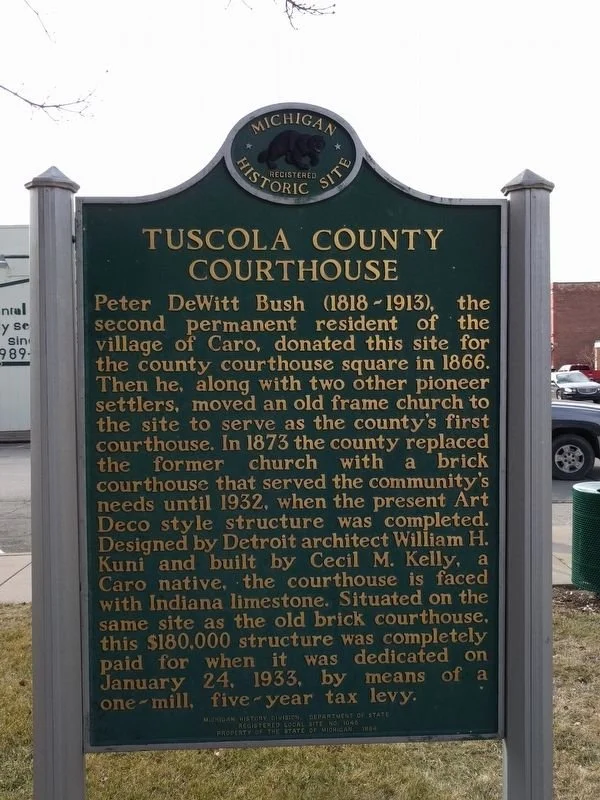Watrousville United Methodist Church
Circuit riders, who traveled through local villages, served the Watrousville United Methodist Church when it was established in 1856.
Tuscola County Fair
On March 11, 1882, thirty-three years after the nation’s first state fair was held in Detroit, the Tuscola County Fair was organized as the Caro District Agricultural Association.
Tuscola County Courthouse
Peter DeWitt Bush (1818-1913), the second permanent resident of the village of Caro, donated this site for the county courthouse square in 1866. In 1873 the county replaced the former church with a brick courthouse that served the community's needs until 1932 when the present Art Deco style structure was completed.
Tuscola County Advertiser
The Tuscola County Advertiser began publishing on August 21, 1868. The city’s oldest surviving business establishment was founded by Henry G. Chapin, a native of Conesus, New York.
Trinity Episcopal Church
This skillfully designed board and batten Gothic Revival church first served local Episcopalians in 1880. The congregation had been formed in 1871, the year the town was incorporated.
Peninsular Sugar Refining Company
The beet sugar industry in Michigan began growing rapidly in the late nineteenth century and is still a popular crop to this day. With more than a century under its belt, there is no shortage of history, Peninsular Sugar Refining Company included.
Caro Roadhouse Museum
The Caro Roadhouse Museum is a small, public museum owned by the City of Caro, Michigan. We conduct a series of annual open house events, designed to attract a variety of age groups and interests, often displaying collections belonging to our local residents. All of our events are free of charge and wheelchair accessible.
First Presbyterian Church of Caro
For the first year, this small group of Presbyterians held their worship and prayer services in the homes of members. Then in 1880, they erected their first house of worship on Lincoln and Pearl Streets. It has had no structural alterations since construction. A regal structure, it features a corner tower and stained glass windows.
Caro Masonic Temple
One of the first brick buildings on Caro’s main street, the structure was built by businessman and philanthropist Charles Montague as a bank and general store. When the building was enlarged in 1887, the entire second story became the Masonic Temple.








